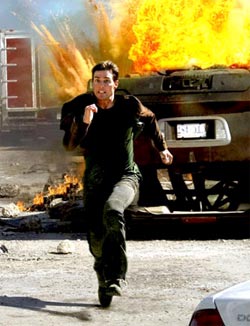“There’s a point where bold becomes stupid.”
– Ving Rhames, M:I:3
Nothing is a better barometer of American culture than the summer action blockbuster. Critics may decry the explosions, the plotless plots, the jackhammer music that echoes with perfect THX fidelity, but look past these conventions, dig into the nuances (scarce as they may be), and we get a whiff of the Zeitgeist, the public’s current fears and desires, what’s in circa now.
When it works, genre has the pull of myth as it takes the standard archetypes (valorous heroes, hissable villains, life-threatening crises) and uses them to pull us into worlds and stories that twist conventions into shocking new shapes. Nowhere is that more evident than in TV action dramas—we may be living in the dark ages when it comes to sit-coms (Everybody Loves Raymond? Will and Grace? C’mon, now), but look at 24, Lost, The Shield or Battlestar Galactica—stories that hurtle with momentum and purpose when they’re firing on all cylinders, solid character work married with technical proficiency and the liberating sense that anything goes. These are entertainments for the post-9/11 age, where bad things can and indeed do happen; Presidents are assassinated, those who are near and dear to us lose their lives, no one is completely trustworthy, and action is played out not as an amusement park fantasy, but as spiritual and physical crucibles where the good guys get it as good as they dish it out—sometimes more. Sure we’re still in the realm of packaged entertainment and formula, but no one complains when the wrapping and the contents are well-executed.
 So when the monolith that is Tom Cruise got around to hiring the latest director to navigate the latest edition of his Mission: Impossible franchise, he made what looked to be an inspired choice: J.J. Abrams, the mastermind behind Alias and Lost. I have an appreciation for early Alias, and the way it luxuriated in the trappings of the spy genre while turning it inside out (spy family drama! How very American) and charging it with emotional resonance. After the bloodless shenanigans of the previous M:I movie (RIP, John Woo), an infusion of earnest yet playful energy seemed the perfect prescription.
So when the monolith that is Tom Cruise got around to hiring the latest director to navigate the latest edition of his Mission: Impossible franchise, he made what looked to be an inspired choice: J.J. Abrams, the mastermind behind Alias and Lost. I have an appreciation for early Alias, and the way it luxuriated in the trappings of the spy genre while turning it inside out (spy family drama! How very American) and charging it with emotional resonance. After the bloodless shenanigans of the previous M:I movie (RIP, John Woo), an infusion of earnest yet playful energy seemed the perfect prescription.
But while the media has its field day with Cruise’s, ahem, eccentricities, the ongoing saga of his Tom-ness obscures the real problem with M:I:3, and what undermines Abrams at every turn: the weight of by-the-numbers Hollywood filmmaking. (In contrast to the quotation that opens this essay, the big studios’ idea of bold is making sure they don’t look stupid, but this only results in risk-averse formula.) Series like Lost or 24 think nothing of killing off a major character, or providing drama and plot turns that test their actors, and even the audience’s connections with them. Risk, in short. But a summer blockbuster has no time for these complications. Better to roll A to B, one action setpiece to the next, the dialogue and drama between the money shots serving only as plot advancers, characters reduced to straitjackets, product placements taking the place of details (watch for that DHL truck). And of course, a sunny happy ending. In Hollywood’s world, 9/11 may have happened, but it’s only a reference point, as opposed to serving as an emotional backdrop that might have a ring of truth about it. (In its way, 24, which features Kiefer Sutherland gritting his teeth and breaking laws and human rights for President and country, plugs into terrorist-age anxieties and assuages them by presenting a hero who does the dirty work better than the worst of them.)
 And so what we have in M:I:3 is a summer action “dream” that plays out more like a migraine. Abrams wants to have his cake and eat it, too—sketch out an intimate, harrowing emotional drama while providing the thrills and spills. This time out, Tom Cruise’s Ethan Hunt is the dedicated family man, ready to walk away from the spy gig and marry his longtime sweetheart (Michelle Monaghan in a thankless role), but the kidnapping of a former disciple (Keri Russell, trying to channel Jennifer Garner) by a ruthless arms dealer (Philip Seymour Hoffman) forces him back into the game, and into a sadistic no-win torture scenario with a microbomb planted inside his skull (migraine indeed), a gun pointed at his love’s head, a countdown to death commencing. As the execs would say, “This time it’s personal.”
And so what we have in M:I:3 is a summer action “dream” that plays out more like a migraine. Abrams wants to have his cake and eat it, too—sketch out an intimate, harrowing emotional drama while providing the thrills and spills. This time out, Tom Cruise’s Ethan Hunt is the dedicated family man, ready to walk away from the spy gig and marry his longtime sweetheart (Michelle Monaghan in a thankless role), but the kidnapping of a former disciple (Keri Russell, trying to channel Jennifer Garner) by a ruthless arms dealer (Philip Seymour Hoffman) forces him back into the game, and into a sadistic no-win torture scenario with a microbomb planted inside his skull (migraine indeed), a gun pointed at his love’s head, a countdown to death commencing. As the execs would say, “This time it’s personal.”
There is actually some grit in that scenario (and more than passing resemblance to the pilot of Alias), but instead of taking the premise to its logical, bracing conclusion, the film backs away, content to fall back on greatest hits—situations cribbed from hallowed moneymakers (Schwarzenegger’s True Lies should get some sort of copyright mention) or echoed from previous M:I films (how many different ways can you show Cruise rappelling down from a great height?), all presented in maximum nausea-inducing shakycam. Alias may have been limited by its TV budget (watch for the L.A. buses in Taipei!), but Abrams showed a deft ability to wring out glamour, suspense, and fluid action under those constraints. M:I:3 screams “big budget” in every frame (hey, that’s really Shanghai!), and its very bigness all but overwhelms Abrams. A helicopter chase through a forest of windmills could have been gripping, but is filmed with the coherence of a car crash. A high dive between Shanghai towers looks good on paper, but comes off as an overload of CGI and green screen. In such a context, Abrams’ emotional underpinnings are hopelessly outclassed. What sticks with us from Alias are the quiet character moments, rather than the sturm und drang of the missions; in M:I:3, these same moments have a perfunctory air, as if we’re just killing time until the next missile blast. It doesn’t help that Cruise is no longer capable of portraying convincing human behavior (more on this in a bit).
 M:I:3‘s good moments, and there are a few, are like deserted isles in the ocean. A kidnapping operation set in the Vatican builds up a good bit of steam, and it’s not a coincidence that it’s the most team-oriented sequence in the film. (Abrams makes token gestures toward a teamwork ethic, but blink and you’ll miss the names of Jonathan Rhys-Meyers and Maggie Q’s characters. When you have charismatic young performers like those two reduced to taking phone calls and looking pretty, you know it’s that kind of movie.) Some of Abrams’ snarky humor shows up in unexpected places, especially when Simon Pegg (essaying a geeky Brit variation on Kevin Wiseman’s gadget master Marshall from Alias) gets into his “anti-God” theory. As the baddie, Hoffman takes what is essentially a nothing role (note to filmmakers: best not to describe the major bad guy in the script as a “weed,” it tends to deflate said bad guy’s stature) and invests it with far more personality than it deserves. Muttering and hissing his lines with curdled flatness, he ratchets up the film’s tension every moment he’s on-screen. Too bad he’s in the film for 15 minutes, tops.
M:I:3‘s good moments, and there are a few, are like deserted isles in the ocean. A kidnapping operation set in the Vatican builds up a good bit of steam, and it’s not a coincidence that it’s the most team-oriented sequence in the film. (Abrams makes token gestures toward a teamwork ethic, but blink and you’ll miss the names of Jonathan Rhys-Meyers and Maggie Q’s characters. When you have charismatic young performers like those two reduced to taking phone calls and looking pretty, you know it’s that kind of movie.) Some of Abrams’ snarky humor shows up in unexpected places, especially when Simon Pegg (essaying a geeky Brit variation on Kevin Wiseman’s gadget master Marshall from Alias) gets into his “anti-God” theory. As the baddie, Hoffman takes what is essentially a nothing role (note to filmmakers: best not to describe the major bad guy in the script as a “weed,” it tends to deflate said bad guy’s stature) and invests it with far more personality than it deserves. Muttering and hissing his lines with curdled flatness, he ratchets up the film’s tension every moment he’s on-screen. Too bad he’s in the film for 15 minutes, tops.
 Whither King Tom? He’s pretty insufferable, and the film languishes when it’s all about him. But he isn’t so much the problem as he is a symptom—he’s no different from any other preening superstar who wants to hog the best lines and camera angles. Lambasting the M:I movies because they’re too Hunt-centric is beside the point; it’s like saying the James Bond movies are too much about James Bond. Trouble only erupts when the film becomes the latest gleaming tribute to the icon that is TOM. M:I:1 was truer to the original TV series’ notion of team-oriented espionage, and yet it was nigh-impossible to sit through due to Cruise’s hammy, mugging performance. In contrast, while M:I:2 was all about Hunt, Woo actually coaxed a relaxed performance from his star. In M:I:3, though, the gloves are off, and Tom is dead-set on proving his acting chops throughout. Take the aforementioned torture sequence—watch Tom as he runs the gamut of Actors Studio emotions, replete with a single tear running down his cheek! Or the tender proposal scene—hold your breath as Tom takes a pregnant pause when his wife-to-be asks him about his secret life! Is he thinking of a possible answer? Counting the number of seconds in his head and equating them to dramatic significance? Or if dialogue ain’t your bag, watch him as he long-jumps across a burning bridge, or runs headlong through the crowded canals of Shanghai, arms pumping, shouting in Chinese for people to “move aside!”, resembling nothing so much as a deranged streaker just before he doffs his clothes. By the time the plot collapses into an anti-climatic showdown between the Cruisemeister and Hoffman, the inexperienced civilian Mrs. Hunt suddenly mowing down bad guys left and right, and then a finale of hugs, smiles, and feelgood laughter, you can be sure of one thing: missions and directors come and go, but Tom reigns supreme.
Whither King Tom? He’s pretty insufferable, and the film languishes when it’s all about him. But he isn’t so much the problem as he is a symptom—he’s no different from any other preening superstar who wants to hog the best lines and camera angles. Lambasting the M:I movies because they’re too Hunt-centric is beside the point; it’s like saying the James Bond movies are too much about James Bond. Trouble only erupts when the film becomes the latest gleaming tribute to the icon that is TOM. M:I:1 was truer to the original TV series’ notion of team-oriented espionage, and yet it was nigh-impossible to sit through due to Cruise’s hammy, mugging performance. In contrast, while M:I:2 was all about Hunt, Woo actually coaxed a relaxed performance from his star. In M:I:3, though, the gloves are off, and Tom is dead-set on proving his acting chops throughout. Take the aforementioned torture sequence—watch Tom as he runs the gamut of Actors Studio emotions, replete with a single tear running down his cheek! Or the tender proposal scene—hold your breath as Tom takes a pregnant pause when his wife-to-be asks him about his secret life! Is he thinking of a possible answer? Counting the number of seconds in his head and equating them to dramatic significance? Or if dialogue ain’t your bag, watch him as he long-jumps across a burning bridge, or runs headlong through the crowded canals of Shanghai, arms pumping, shouting in Chinese for people to “move aside!”, resembling nothing so much as a deranged streaker just before he doffs his clothes. By the time the plot collapses into an anti-climatic showdown between the Cruisemeister and Hoffman, the inexperienced civilian Mrs. Hunt suddenly mowing down bad guys left and right, and then a finale of hugs, smiles, and feelgood laughter, you can be sure of one thing: missions and directors come and go, but Tom reigns supreme.
Or does he? Like a mission assignment that self-destructs in five seconds, the clock is ticking on Cruise’s career as a convincing young leading-man type. His performances early in his career may have been callow, but they also contained pliability and promise. However, since Rain Man (his one great performance) and Born on the Fourth of July, which took a torch to his everyman American hero image, a stubborn masochistic streak has inhabited his work (no big surprise, as narcissism and masochism go hand-in-hand). It’s not enough to be Tom Cruise, universally loved and envied; now he must be Tom Cruise, suffering for being who he is (hello there, Magnolia and Vanilla Sky). At this stage of his career, he’s served best by a story or a director who can poke gentle fun at his image while still acknowledging his movie-star sparkle (i.e., Cameron Crowe’s Jerry Maguire). In M:I:3, it’s business as usual—that is, it’s all about Tom Cruise, the hardest working man in the movie business. But look closely at his face as he goes through his patented quirks, strains, and grins, and you can see the waxen features, the unearthly mix of wrinkles and babyish cheeks, as if he has become his own android. Perhaps years from now people will look back on this film, and its star, as a representation of a lost age—a time when formulas determined movies rather than compelling stories, and the notion of a superstar actor huffing and puffing to prove he is a star actually seemed quaint. ■


Comments
Anonymous
You should try not to overthink things.. I get this feeling you're a little jealous of Cruise! ahhhah